Analysis of Maritime Law and Coastal Management in Pristine Island
VerifiedAdded on 2023/05/29
|16
|6399
|338
Case Study
AI Summary
This case study examines the challenges faced by Pristine Island, a developing state adjacent to Trinidad and Tobago, in managing its coastal areas for sustainable development. The island's government is concerned about environmental degradation, particularly the pollution of marine resources, and aims to achieve several Sustainable Development Goals (SDGs). The study analyzes existing environmental legislation, including the Town and Country Planning Act, the Municipal Corporations Act 1990, and the Marine Areas Act, focusing on the concept of 'nuisance' and legal precedents such as Rylan’s vs. Fletcher and Cambridge Water Co v Eastern Leather plc. It also discusses remedies available to the government for marine environment contamination, including recovering damages and injunctions. The analysis considers the balance between development and environmental protection under maritime law, highlighting the complexities of enforcing environmental regulations and ensuring accountability for environmental damage. Desklib offers a platform to explore similar solved assignments and past papers.
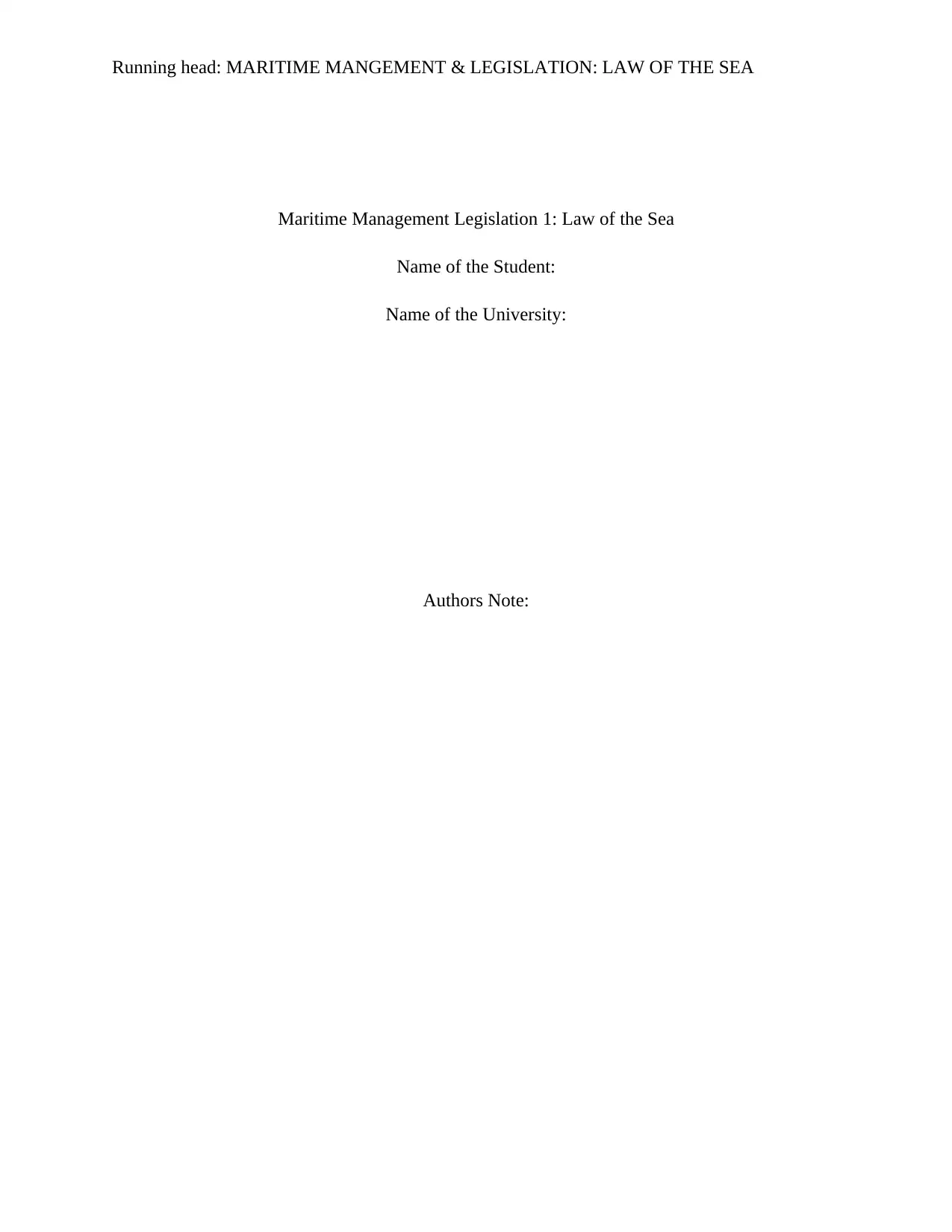
Running head: MARITIME MANGEMENT & LEGISLATION: LAW OF THE SEA
Maritime Management Legislation 1: Law of the Sea
Name of the Student:
Name of the University:
Authors Note:
Maritime Management Legislation 1: Law of the Sea
Name of the Student:
Name of the University:
Authors Note:
Paraphrase This Document
Need a fresh take? Get an instant paraphrase of this document with our AI Paraphraser
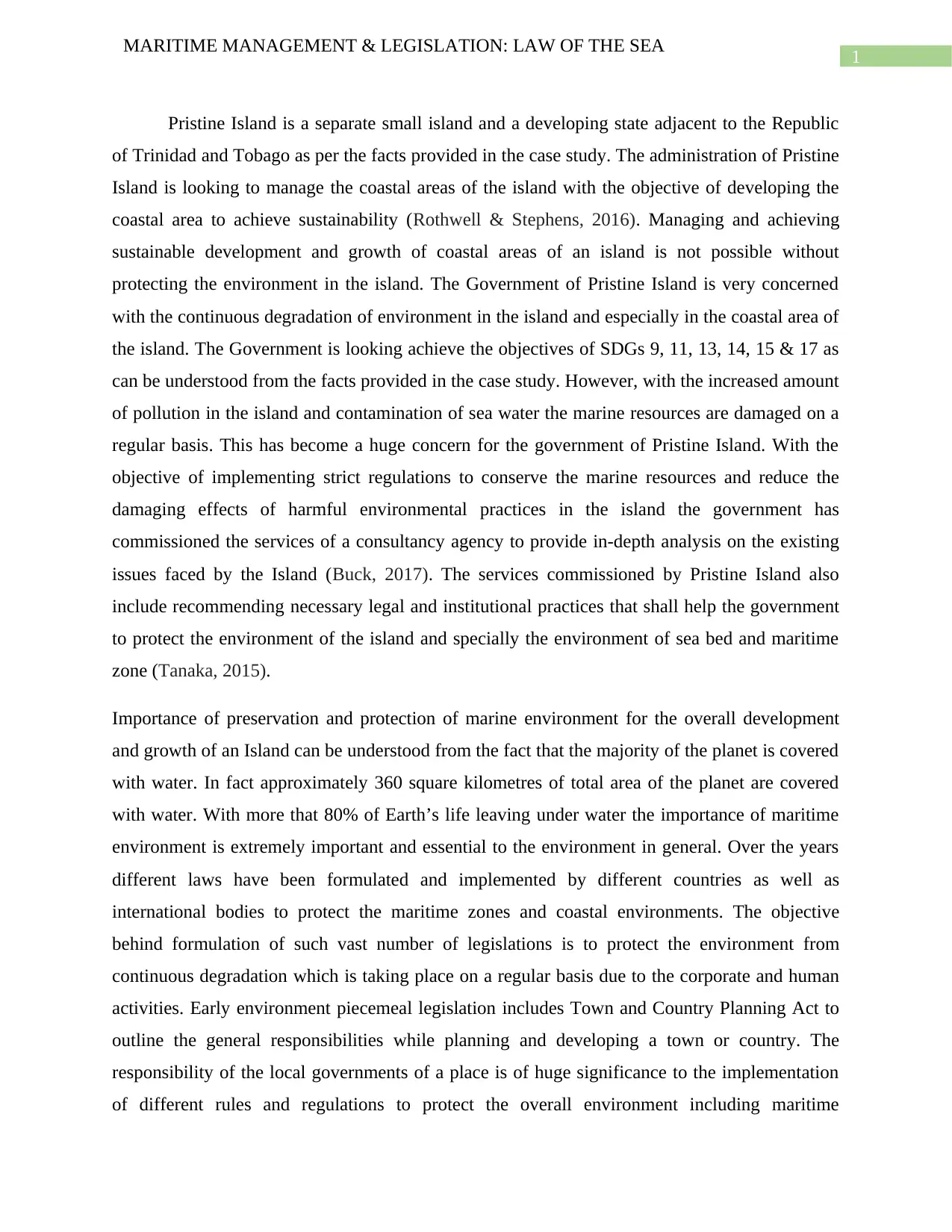
1
MARITIME MANAGEMENT & LEGISLATION: LAW OF THE SEA
Pristine Island is a separate small island and a developing state adjacent to the Republic
of Trinidad and Tobago as per the facts provided in the case study. The administration of Pristine
Island is looking to manage the coastal areas of the island with the objective of developing the
coastal area to achieve sustainability (Rothwell & Stephens, 2016). Managing and achieving
sustainable development and growth of coastal areas of an island is not possible without
protecting the environment in the island. The Government of Pristine Island is very concerned
with the continuous degradation of environment in the island and especially in the coastal area of
the island. The Government is looking achieve the objectives of SDGs 9, 11, 13, 14, 15 & 17 as
can be understood from the facts provided in the case study. However, with the increased amount
of pollution in the island and contamination of sea water the marine resources are damaged on a
regular basis. This has become a huge concern for the government of Pristine Island. With the
objective of implementing strict regulations to conserve the marine resources and reduce the
damaging effects of harmful environmental practices in the island the government has
commissioned the services of a consultancy agency to provide in-depth analysis on the existing
issues faced by the Island (Buck, 2017). The services commissioned by Pristine Island also
include recommending necessary legal and institutional practices that shall help the government
to protect the environment of the island and specially the environment of sea bed and maritime
zone (Tanaka, 2015).
Importance of preservation and protection of marine environment for the overall development
and growth of an Island can be understood from the fact that the majority of the planet is covered
with water. In fact approximately 360 square kilometres of total area of the planet are covered
with water. With more that 80% of Earth’s life leaving under water the importance of maritime
environment is extremely important and essential to the environment in general. Over the years
different laws have been formulated and implemented by different countries as well as
international bodies to protect the maritime zones and coastal environments. The objective
behind formulation of such vast number of legislations is to protect the environment from
continuous degradation which is taking place on a regular basis due to the corporate and human
activities. Early environment piecemeal legislation includes Town and Country Planning Act to
outline the general responsibilities while planning and developing a town or country. The
responsibility of the local governments of a place is of huge significance to the implementation
of different rules and regulations to protect the overall environment including maritime
MARITIME MANAGEMENT & LEGISLATION: LAW OF THE SEA
Pristine Island is a separate small island and a developing state adjacent to the Republic
of Trinidad and Tobago as per the facts provided in the case study. The administration of Pristine
Island is looking to manage the coastal areas of the island with the objective of developing the
coastal area to achieve sustainability (Rothwell & Stephens, 2016). Managing and achieving
sustainable development and growth of coastal areas of an island is not possible without
protecting the environment in the island. The Government of Pristine Island is very concerned
with the continuous degradation of environment in the island and especially in the coastal area of
the island. The Government is looking achieve the objectives of SDGs 9, 11, 13, 14, 15 & 17 as
can be understood from the facts provided in the case study. However, with the increased amount
of pollution in the island and contamination of sea water the marine resources are damaged on a
regular basis. This has become a huge concern for the government of Pristine Island. With the
objective of implementing strict regulations to conserve the marine resources and reduce the
damaging effects of harmful environmental practices in the island the government has
commissioned the services of a consultancy agency to provide in-depth analysis on the existing
issues faced by the Island (Buck, 2017). The services commissioned by Pristine Island also
include recommending necessary legal and institutional practices that shall help the government
to protect the environment of the island and specially the environment of sea bed and maritime
zone (Tanaka, 2015).
Importance of preservation and protection of marine environment for the overall development
and growth of an Island can be understood from the fact that the majority of the planet is covered
with water. In fact approximately 360 square kilometres of total area of the planet are covered
with water. With more that 80% of Earth’s life leaving under water the importance of maritime
environment is extremely important and essential to the environment in general. Over the years
different laws have been formulated and implemented by different countries as well as
international bodies to protect the maritime zones and coastal environments. The objective
behind formulation of such vast number of legislations is to protect the environment from
continuous degradation which is taking place on a regular basis due to the corporate and human
activities. Early environment piecemeal legislation includes Town and Country Planning Act to
outline the general responsibilities while planning and developing a town or country. The
responsibility of the local governments of a place is of huge significance to the implementation
of different rules and regulations to protect the overall environment including maritime
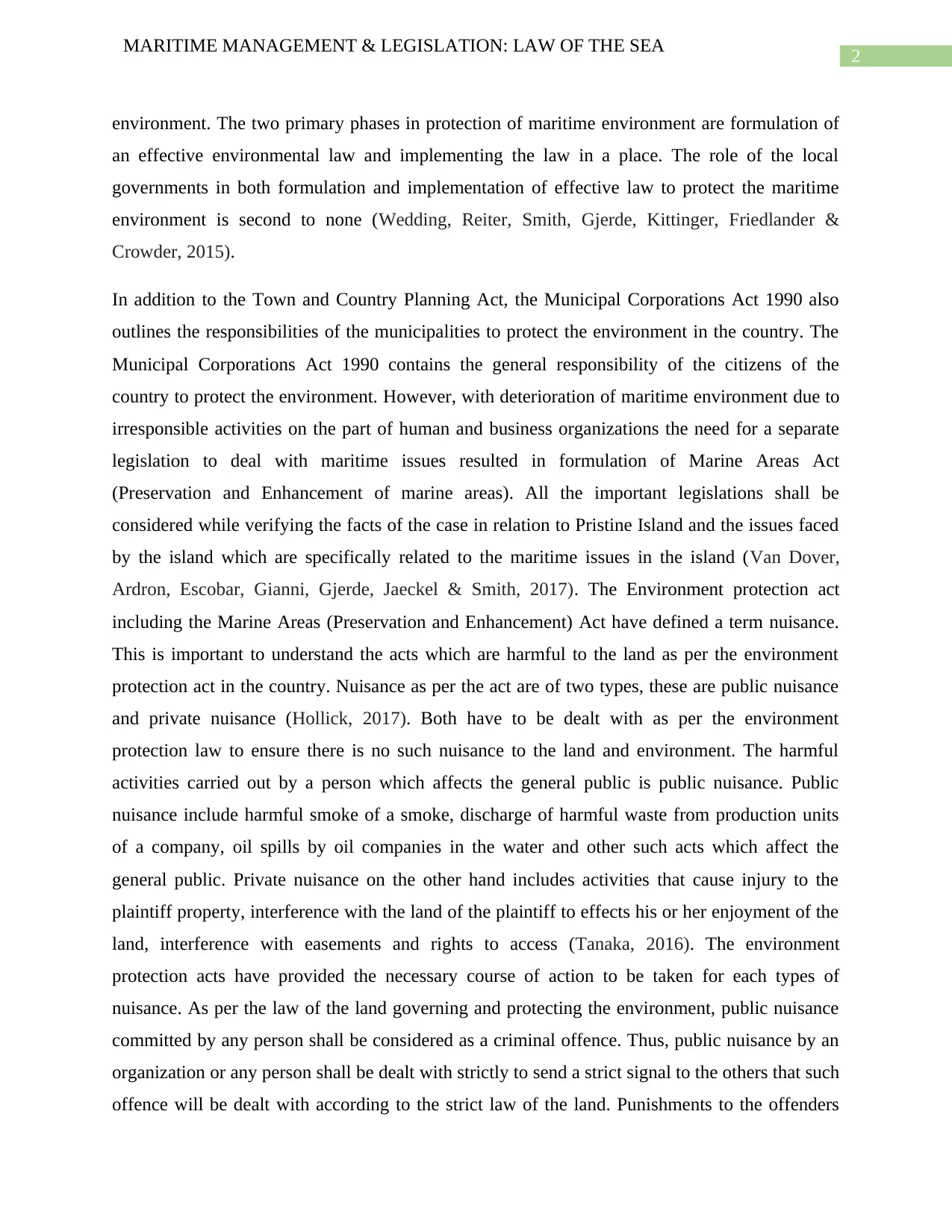
2
MARITIME MANAGEMENT & LEGISLATION: LAW OF THE SEA
environment. The two primary phases in protection of maritime environment are formulation of
an effective environmental law and implementing the law in a place. The role of the local
governments in both formulation and implementation of effective law to protect the maritime
environment is second to none (Wedding, Reiter, Smith, Gjerde, Kittinger, Friedlander &
Crowder, 2015).
In addition to the Town and Country Planning Act, the Municipal Corporations Act 1990 also
outlines the responsibilities of the municipalities to protect the environment in the country. The
Municipal Corporations Act 1990 contains the general responsibility of the citizens of the
country to protect the environment. However, with deterioration of maritime environment due to
irresponsible activities on the part of human and business organizations the need for a separate
legislation to deal with maritime issues resulted in formulation of Marine Areas Act
(Preservation and Enhancement of marine areas). All the important legislations shall be
considered while verifying the facts of the case in relation to Pristine Island and the issues faced
by the island which are specifically related to the maritime issues in the island (Van Dover,
Ardron, Escobar, Gianni, Gjerde, Jaeckel & Smith, 2017). The Environment protection act
including the Marine Areas (Preservation and Enhancement) Act have defined a term nuisance.
This is important to understand the acts which are harmful to the land as per the environment
protection act in the country. Nuisance as per the act are of two types, these are public nuisance
and private nuisance (Hollick, 2017). Both have to be dealt with as per the environment
protection law to ensure there is no such nuisance to the land and environment. The harmful
activities carried out by a person which affects the general public is public nuisance. Public
nuisance include harmful smoke of a smoke, discharge of harmful waste from production units
of a company, oil spills by oil companies in the water and other such acts which affect the
general public. Private nuisance on the other hand includes activities that cause injury to the
plaintiff property, interference with the land of the plaintiff to effects his or her enjoyment of the
land, interference with easements and rights to access (Tanaka, 2016). The environment
protection acts have provided the necessary course of action to be taken for each types of
nuisance. As per the law of the land governing and protecting the environment, public nuisance
committed by any person shall be considered as a criminal offence. Thus, public nuisance by an
organization or any person shall be dealt with strictly to send a strict signal to the others that such
offence will be dealt with according to the strict law of the land. Punishments to the offenders
MARITIME MANAGEMENT & LEGISLATION: LAW OF THE SEA
environment. The two primary phases in protection of maritime environment are formulation of
an effective environmental law and implementing the law in a place. The role of the local
governments in both formulation and implementation of effective law to protect the maritime
environment is second to none (Wedding, Reiter, Smith, Gjerde, Kittinger, Friedlander &
Crowder, 2015).
In addition to the Town and Country Planning Act, the Municipal Corporations Act 1990 also
outlines the responsibilities of the municipalities to protect the environment in the country. The
Municipal Corporations Act 1990 contains the general responsibility of the citizens of the
country to protect the environment. However, with deterioration of maritime environment due to
irresponsible activities on the part of human and business organizations the need for a separate
legislation to deal with maritime issues resulted in formulation of Marine Areas Act
(Preservation and Enhancement of marine areas). All the important legislations shall be
considered while verifying the facts of the case in relation to Pristine Island and the issues faced
by the island which are specifically related to the maritime issues in the island (Van Dover,
Ardron, Escobar, Gianni, Gjerde, Jaeckel & Smith, 2017). The Environment protection act
including the Marine Areas (Preservation and Enhancement) Act have defined a term nuisance.
This is important to understand the acts which are harmful to the land as per the environment
protection act in the country. Nuisance as per the act are of two types, these are public nuisance
and private nuisance (Hollick, 2017). Both have to be dealt with as per the environment
protection law to ensure there is no such nuisance to the land and environment. The harmful
activities carried out by a person which affects the general public is public nuisance. Public
nuisance include harmful smoke of a smoke, discharge of harmful waste from production units
of a company, oil spills by oil companies in the water and other such acts which affect the
general public. Private nuisance on the other hand includes activities that cause injury to the
plaintiff property, interference with the land of the plaintiff to effects his or her enjoyment of the
land, interference with easements and rights to access (Tanaka, 2016). The environment
protection acts have provided the necessary course of action to be taken for each types of
nuisance. As per the law of the land governing and protecting the environment, public nuisance
committed by any person shall be considered as a criminal offence. Thus, public nuisance by an
organization or any person shall be dealt with strictly to send a strict signal to the others that such
offence will be dealt with according to the strict law of the land. Punishments to the offenders
⊘ This is a preview!⊘
Do you want full access?
Subscribe today to unlock all pages.

Trusted by 1+ million students worldwide
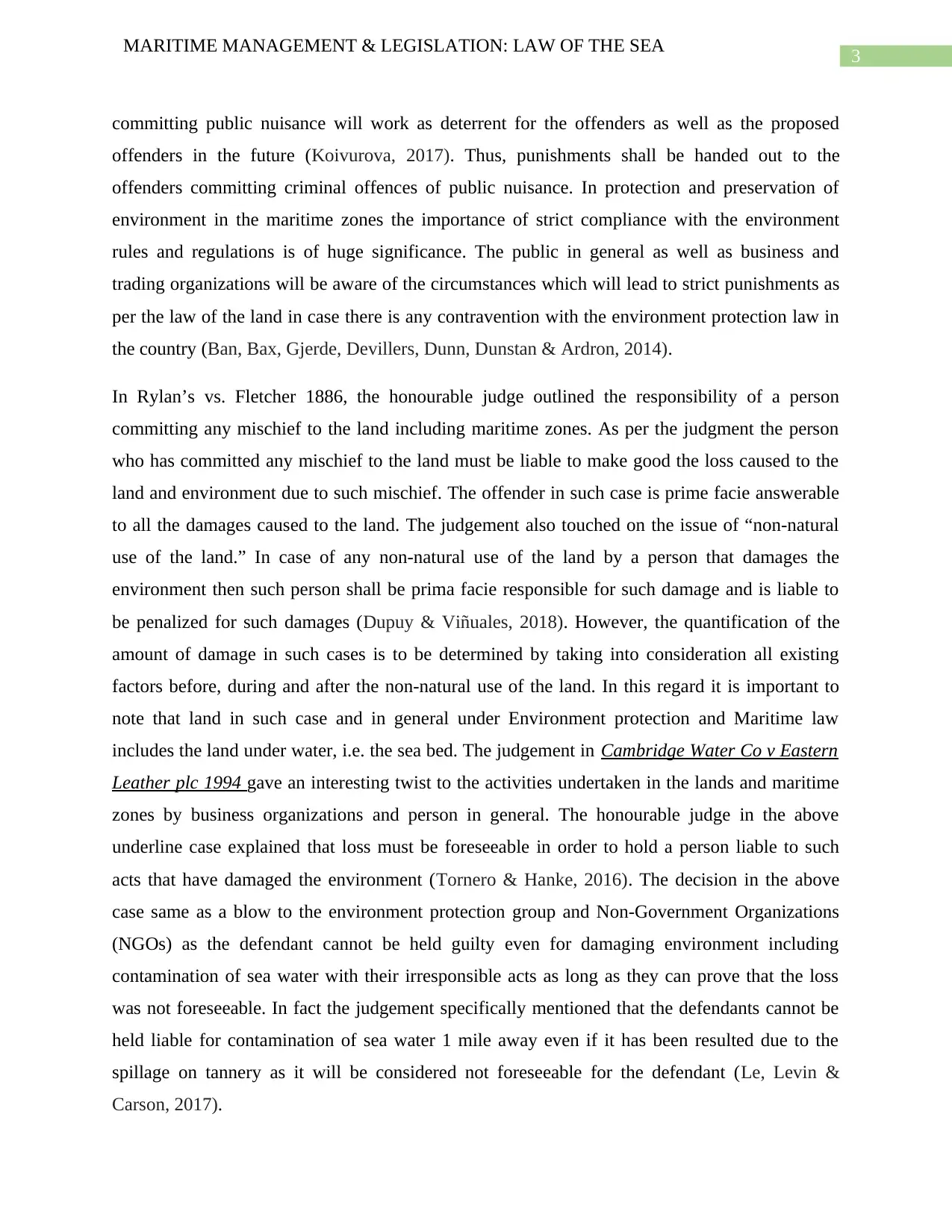
3
MARITIME MANAGEMENT & LEGISLATION: LAW OF THE SEA
committing public nuisance will work as deterrent for the offenders as well as the proposed
offenders in the future (Koivurova, 2017). Thus, punishments shall be handed out to the
offenders committing criminal offences of public nuisance. In protection and preservation of
environment in the maritime zones the importance of strict compliance with the environment
rules and regulations is of huge significance. The public in general as well as business and
trading organizations will be aware of the circumstances which will lead to strict punishments as
per the law of the land in case there is any contravention with the environment protection law in
the country (Ban, Bax, Gjerde, Devillers, Dunn, Dunstan & Ardron, 2014).
In Rylan’s vs. Fletcher 1886, the honourable judge outlined the responsibility of a person
committing any mischief to the land including maritime zones. As per the judgment the person
who has committed any mischief to the land must be liable to make good the loss caused to the
land and environment due to such mischief. The offender in such case is prime facie answerable
to all the damages caused to the land. The judgement also touched on the issue of “non-natural
use of the land.” In case of any non-natural use of the land by a person that damages the
environment then such person shall be prima facie responsible for such damage and is liable to
be penalized for such damages (Dupuy & Viñuales, 2018). However, the quantification of the
amount of damage in such cases is to be determined by taking into consideration all existing
factors before, during and after the non-natural use of the land. In this regard it is important to
note that land in such case and in general under Environment protection and Maritime law
includes the land under water, i.e. the sea bed. The judgement in Cambridge Water Co v Eastern
Leather plc 1994 gave an interesting twist to the activities undertaken in the lands and maritime
zones by business organizations and person in general. The honourable judge in the above
underline case explained that loss must be foreseeable in order to hold a person liable to such
acts that have damaged the environment (Tornero & Hanke, 2016). The decision in the above
case same as a blow to the environment protection group and Non-Government Organizations
(NGOs) as the defendant cannot be held guilty even for damaging environment including
contamination of sea water with their irresponsible acts as long as they can prove that the loss
was not foreseeable. In fact the judgement specifically mentioned that the defendants cannot be
held liable for contamination of sea water 1 mile away even if it has been resulted due to the
spillage on tannery as it will be considered not foreseeable for the defendant (Le, Levin &
Carson, 2017).
MARITIME MANAGEMENT & LEGISLATION: LAW OF THE SEA
committing public nuisance will work as deterrent for the offenders as well as the proposed
offenders in the future (Koivurova, 2017). Thus, punishments shall be handed out to the
offenders committing criminal offences of public nuisance. In protection and preservation of
environment in the maritime zones the importance of strict compliance with the environment
rules and regulations is of huge significance. The public in general as well as business and
trading organizations will be aware of the circumstances which will lead to strict punishments as
per the law of the land in case there is any contravention with the environment protection law in
the country (Ban, Bax, Gjerde, Devillers, Dunn, Dunstan & Ardron, 2014).
In Rylan’s vs. Fletcher 1886, the honourable judge outlined the responsibility of a person
committing any mischief to the land including maritime zones. As per the judgment the person
who has committed any mischief to the land must be liable to make good the loss caused to the
land and environment due to such mischief. The offender in such case is prime facie answerable
to all the damages caused to the land. The judgement also touched on the issue of “non-natural
use of the land.” In case of any non-natural use of the land by a person that damages the
environment then such person shall be prima facie responsible for such damage and is liable to
be penalized for such damages (Dupuy & Viñuales, 2018). However, the quantification of the
amount of damage in such cases is to be determined by taking into consideration all existing
factors before, during and after the non-natural use of the land. In this regard it is important to
note that land in such case and in general under Environment protection and Maritime law
includes the land under water, i.e. the sea bed. The judgement in Cambridge Water Co v Eastern
Leather plc 1994 gave an interesting twist to the activities undertaken in the lands and maritime
zones by business organizations and person in general. The honourable judge in the above
underline case explained that loss must be foreseeable in order to hold a person liable to such
acts that have damaged the environment (Tornero & Hanke, 2016). The decision in the above
case same as a blow to the environment protection group and Non-Government Organizations
(NGOs) as the defendant cannot be held guilty even for damaging environment including
contamination of sea water with their irresponsible acts as long as they can prove that the loss
was not foreseeable. In fact the judgement specifically mentioned that the defendants cannot be
held liable for contamination of sea water 1 mile away even if it has been resulted due to the
spillage on tannery as it will be considered not foreseeable for the defendant (Le, Levin &
Carson, 2017).
Paraphrase This Document
Need a fresh take? Get an instant paraphrase of this document with our AI Paraphraser
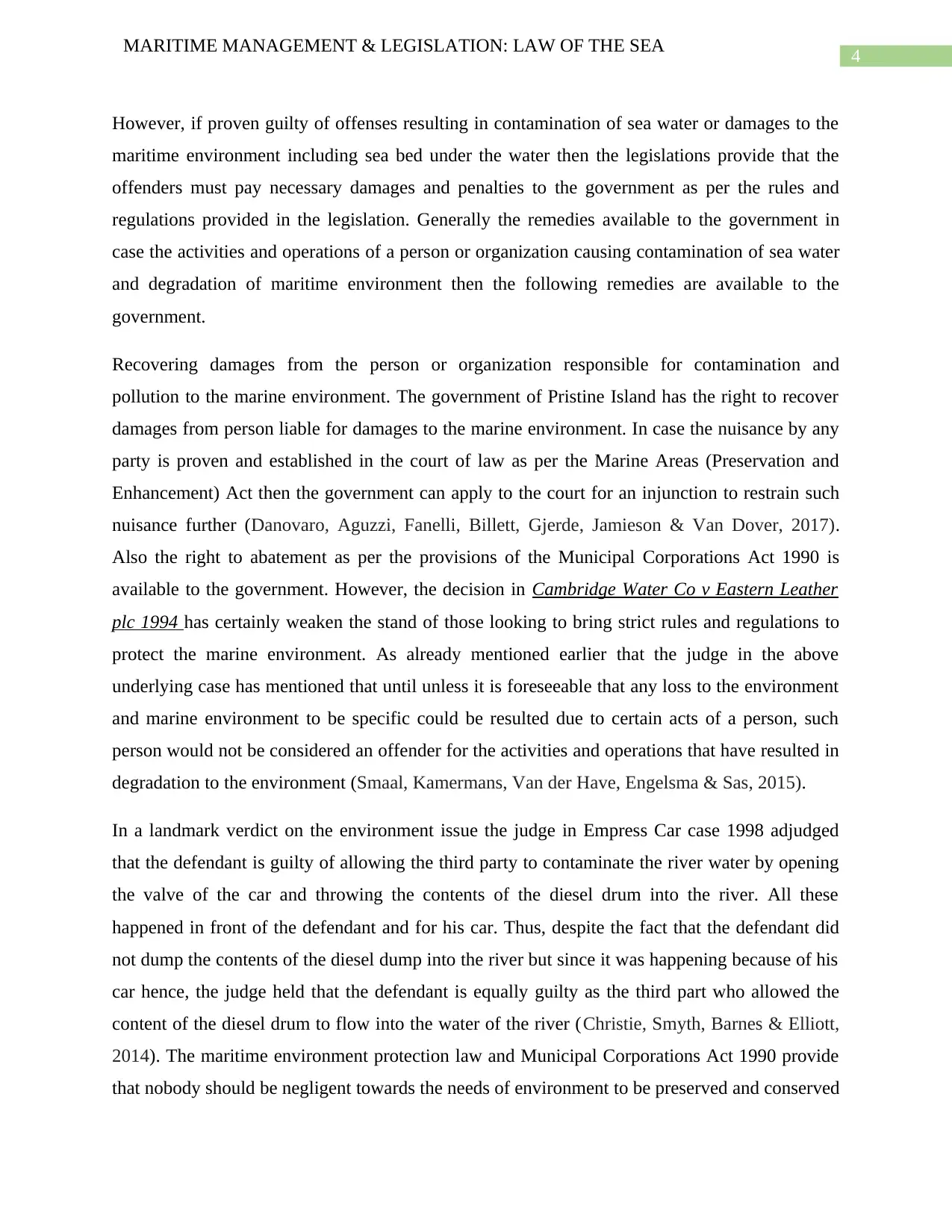
4
MARITIME MANAGEMENT & LEGISLATION: LAW OF THE SEA
However, if proven guilty of offenses resulting in contamination of sea water or damages to the
maritime environment including sea bed under the water then the legislations provide that the
offenders must pay necessary damages and penalties to the government as per the rules and
regulations provided in the legislation. Generally the remedies available to the government in
case the activities and operations of a person or organization causing contamination of sea water
and degradation of maritime environment then the following remedies are available to the
government.
Recovering damages from the person or organization responsible for contamination and
pollution to the marine environment. The government of Pristine Island has the right to recover
damages from person liable for damages to the marine environment. In case the nuisance by any
party is proven and established in the court of law as per the Marine Areas (Preservation and
Enhancement) Act then the government can apply to the court for an injunction to restrain such
nuisance further (Danovaro, Aguzzi, Fanelli, Billett, Gjerde, Jamieson & Van Dover, 2017).
Also the right to abatement as per the provisions of the Municipal Corporations Act 1990 is
available to the government. However, the decision in Cambridge Water Co v Eastern Leather
plc 1994 has certainly weaken the stand of those looking to bring strict rules and regulations to
protect the marine environment. As already mentioned earlier that the judge in the above
underlying case has mentioned that until unless it is foreseeable that any loss to the environment
and marine environment to be specific could be resulted due to certain acts of a person, such
person would not be considered an offender for the activities and operations that have resulted in
degradation to the environment (Smaal, Kamermans, Van der Have, Engelsma & Sas, 2015).
In a landmark verdict on the environment issue the judge in Empress Car case 1998 adjudged
that the defendant is guilty of allowing the third party to contaminate the river water by opening
the valve of the car and throwing the contents of the diesel drum into the river. All these
happened in front of the defendant and for his car. Thus, despite the fact that the defendant did
not dump the contents of the diesel dump into the river but since it was happening because of his
car hence, the judge held that the defendant is equally guilty as the third part who allowed the
content of the diesel drum to flow into the water of the river (Christie, Smyth, Barnes & Elliott,
2014). The maritime environment protection law and Municipal Corporations Act 1990 provide
that nobody should be negligent towards the needs of environment to be preserved and conserved
MARITIME MANAGEMENT & LEGISLATION: LAW OF THE SEA
However, if proven guilty of offenses resulting in contamination of sea water or damages to the
maritime environment including sea bed under the water then the legislations provide that the
offenders must pay necessary damages and penalties to the government as per the rules and
regulations provided in the legislation. Generally the remedies available to the government in
case the activities and operations of a person or organization causing contamination of sea water
and degradation of maritime environment then the following remedies are available to the
government.
Recovering damages from the person or organization responsible for contamination and
pollution to the marine environment. The government of Pristine Island has the right to recover
damages from person liable for damages to the marine environment. In case the nuisance by any
party is proven and established in the court of law as per the Marine Areas (Preservation and
Enhancement) Act then the government can apply to the court for an injunction to restrain such
nuisance further (Danovaro, Aguzzi, Fanelli, Billett, Gjerde, Jamieson & Van Dover, 2017).
Also the right to abatement as per the provisions of the Municipal Corporations Act 1990 is
available to the government. However, the decision in Cambridge Water Co v Eastern Leather
plc 1994 has certainly weaken the stand of those looking to bring strict rules and regulations to
protect the marine environment. As already mentioned earlier that the judge in the above
underlying case has mentioned that until unless it is foreseeable that any loss to the environment
and marine environment to be specific could be resulted due to certain acts of a person, such
person would not be considered an offender for the activities and operations that have resulted in
degradation to the environment (Smaal, Kamermans, Van der Have, Engelsma & Sas, 2015).
In a landmark verdict on the environment issue the judge in Empress Car case 1998 adjudged
that the defendant is guilty of allowing the third party to contaminate the river water by opening
the valve of the car and throwing the contents of the diesel drum into the river. All these
happened in front of the defendant and for his car. Thus, despite the fact that the defendant did
not dump the contents of the diesel dump into the river but since it was happening because of his
car hence, the judge held that the defendant is equally guilty as the third part who allowed the
content of the diesel drum to flow into the water of the river (Christie, Smyth, Barnes & Elliott,
2014). The maritime environment protection law and Municipal Corporations Act 1990 provide
that nobody should be negligent towards the needs of environment to be preserved and conserved
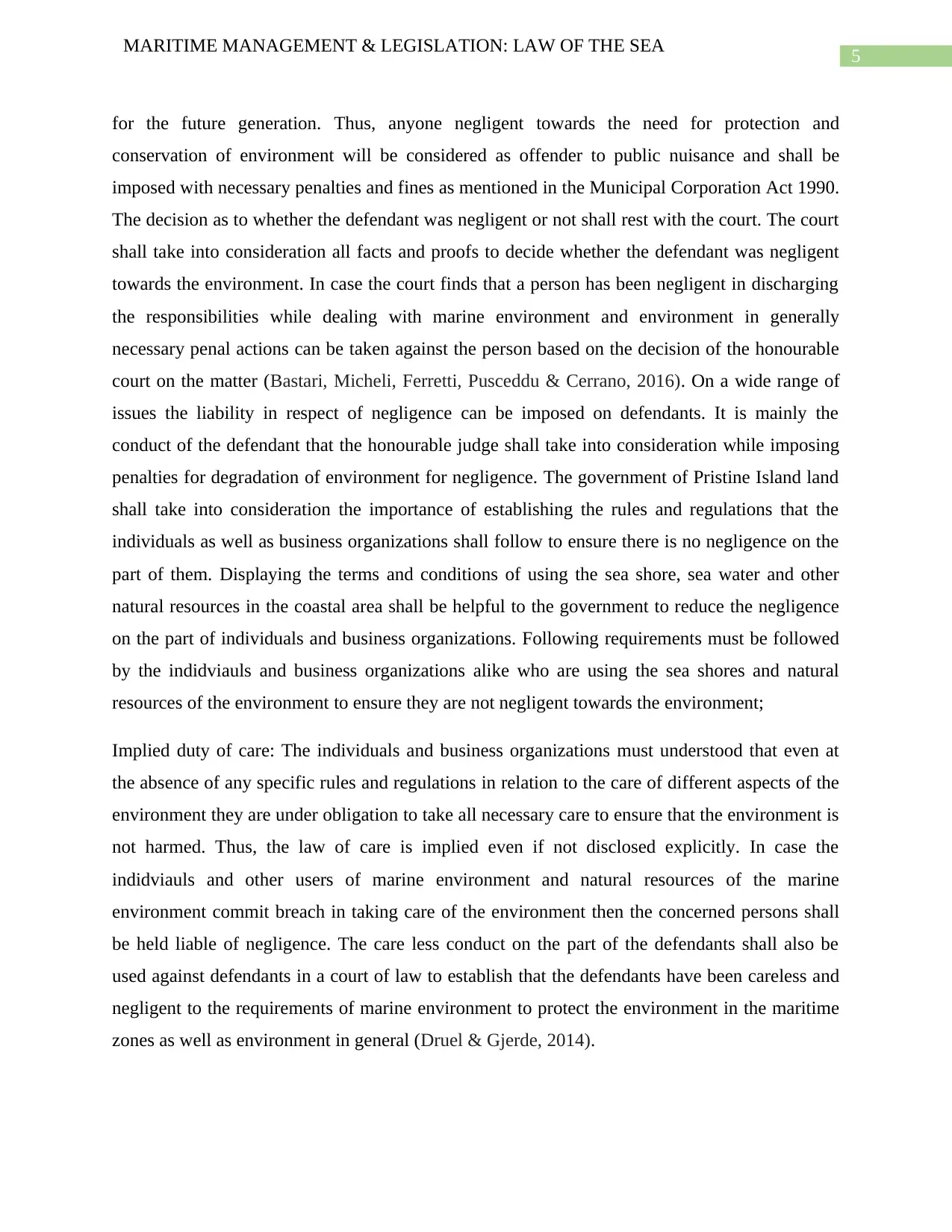
5
MARITIME MANAGEMENT & LEGISLATION: LAW OF THE SEA
for the future generation. Thus, anyone negligent towards the need for protection and
conservation of environment will be considered as offender to public nuisance and shall be
imposed with necessary penalties and fines as mentioned in the Municipal Corporation Act 1990.
The decision as to whether the defendant was negligent or not shall rest with the court. The court
shall take into consideration all facts and proofs to decide whether the defendant was negligent
towards the environment. In case the court finds that a person has been negligent in discharging
the responsibilities while dealing with marine environment and environment in generally
necessary penal actions can be taken against the person based on the decision of the honourable
court on the matter (Bastari, Micheli, Ferretti, Pusceddu & Cerrano, 2016). On a wide range of
issues the liability in respect of negligence can be imposed on defendants. It is mainly the
conduct of the defendant that the honourable judge shall take into consideration while imposing
penalties for degradation of environment for negligence. The government of Pristine Island land
shall take into consideration the importance of establishing the rules and regulations that the
individuals as well as business organizations shall follow to ensure there is no negligence on the
part of them. Displaying the terms and conditions of using the sea shore, sea water and other
natural resources in the coastal area shall be helpful to the government to reduce the negligence
on the part of individuals and business organizations. Following requirements must be followed
by the indidviauls and business organizations alike who are using the sea shores and natural
resources of the environment to ensure they are not negligent towards the environment;
Implied duty of care: The individuals and business organizations must understood that even at
the absence of any specific rules and regulations in relation to the care of different aspects of the
environment they are under obligation to take all necessary care to ensure that the environment is
not harmed. Thus, the law of care is implied even if not disclosed explicitly. In case the
indidviauls and other users of marine environment and natural resources of the marine
environment commit breach in taking care of the environment then the concerned persons shall
be held liable of negligence. The care less conduct on the part of the defendants shall also be
used against defendants in a court of law to establish that the defendants have been careless and
negligent to the requirements of marine environment to protect the environment in the maritime
zones as well as environment in general (Druel & Gjerde, 2014).
MARITIME MANAGEMENT & LEGISLATION: LAW OF THE SEA
for the future generation. Thus, anyone negligent towards the need for protection and
conservation of environment will be considered as offender to public nuisance and shall be
imposed with necessary penalties and fines as mentioned in the Municipal Corporation Act 1990.
The decision as to whether the defendant was negligent or not shall rest with the court. The court
shall take into consideration all facts and proofs to decide whether the defendant was negligent
towards the environment. In case the court finds that a person has been negligent in discharging
the responsibilities while dealing with marine environment and environment in generally
necessary penal actions can be taken against the person based on the decision of the honourable
court on the matter (Bastari, Micheli, Ferretti, Pusceddu & Cerrano, 2016). On a wide range of
issues the liability in respect of negligence can be imposed on defendants. It is mainly the
conduct of the defendant that the honourable judge shall take into consideration while imposing
penalties for degradation of environment for negligence. The government of Pristine Island land
shall take into consideration the importance of establishing the rules and regulations that the
individuals as well as business organizations shall follow to ensure there is no negligence on the
part of them. Displaying the terms and conditions of using the sea shore, sea water and other
natural resources in the coastal area shall be helpful to the government to reduce the negligence
on the part of individuals and business organizations. Following requirements must be followed
by the indidviauls and business organizations alike who are using the sea shores and natural
resources of the environment to ensure they are not negligent towards the environment;
Implied duty of care: The individuals and business organizations must understood that even at
the absence of any specific rules and regulations in relation to the care of different aspects of the
environment they are under obligation to take all necessary care to ensure that the environment is
not harmed. Thus, the law of care is implied even if not disclosed explicitly. In case the
indidviauls and other users of marine environment and natural resources of the marine
environment commit breach in taking care of the environment then the concerned persons shall
be held liable of negligence. The care less conduct on the part of the defendants shall also be
used against defendants in a court of law to establish that the defendants have been careless and
negligent to the requirements of marine environment to protect the environment in the maritime
zones as well as environment in general (Druel & Gjerde, 2014).
⊘ This is a preview!⊘
Do you want full access?
Subscribe today to unlock all pages.

Trusted by 1+ million students worldwide
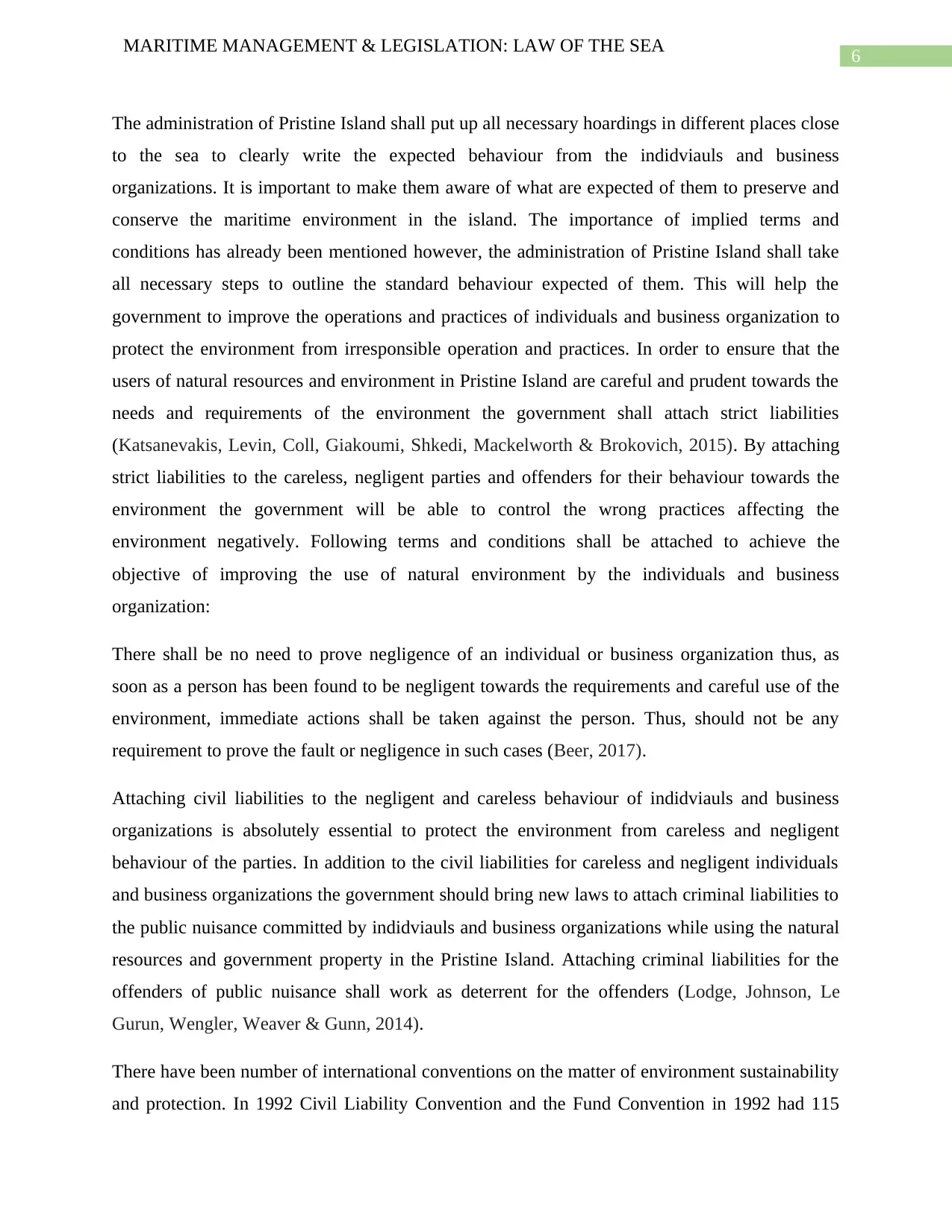
6
MARITIME MANAGEMENT & LEGISLATION: LAW OF THE SEA
The administration of Pristine Island shall put up all necessary hoardings in different places close
to the sea to clearly write the expected behaviour from the indidviauls and business
organizations. It is important to make them aware of what are expected of them to preserve and
conserve the maritime environment in the island. The importance of implied terms and
conditions has already been mentioned however, the administration of Pristine Island shall take
all necessary steps to outline the standard behaviour expected of them. This will help the
government to improve the operations and practices of individuals and business organization to
protect the environment from irresponsible operation and practices. In order to ensure that the
users of natural resources and environment in Pristine Island are careful and prudent towards the
needs and requirements of the environment the government shall attach strict liabilities
(Katsanevakis, Levin, Coll, Giakoumi, Shkedi, Mackelworth & Brokovich, 2015). By attaching
strict liabilities to the careless, negligent parties and offenders for their behaviour towards the
environment the government will be able to control the wrong practices affecting the
environment negatively. Following terms and conditions shall be attached to achieve the
objective of improving the use of natural environment by the individuals and business
organization:
There shall be no need to prove negligence of an individual or business organization thus, as
soon as a person has been found to be negligent towards the requirements and careful use of the
environment, immediate actions shall be taken against the person. Thus, should not be any
requirement to prove the fault or negligence in such cases (Beer, 2017).
Attaching civil liabilities to the negligent and careless behaviour of indidviauls and business
organizations is absolutely essential to protect the environment from careless and negligent
behaviour of the parties. In addition to the civil liabilities for careless and negligent individuals
and business organizations the government should bring new laws to attach criminal liabilities to
the public nuisance committed by indidviauls and business organizations while using the natural
resources and government property in the Pristine Island. Attaching criminal liabilities for the
offenders of public nuisance shall work as deterrent for the offenders (Lodge, Johnson, Le
Gurun, Wengler, Weaver & Gunn, 2014).
There have been number of international conventions on the matter of environment sustainability
and protection. In 1992 Civil Liability Convention and the Fund Convention in 1992 had 115
MARITIME MANAGEMENT & LEGISLATION: LAW OF THE SEA
The administration of Pristine Island shall put up all necessary hoardings in different places close
to the sea to clearly write the expected behaviour from the indidviauls and business
organizations. It is important to make them aware of what are expected of them to preserve and
conserve the maritime environment in the island. The importance of implied terms and
conditions has already been mentioned however, the administration of Pristine Island shall take
all necessary steps to outline the standard behaviour expected of them. This will help the
government to improve the operations and practices of individuals and business organization to
protect the environment from irresponsible operation and practices. In order to ensure that the
users of natural resources and environment in Pristine Island are careful and prudent towards the
needs and requirements of the environment the government shall attach strict liabilities
(Katsanevakis, Levin, Coll, Giakoumi, Shkedi, Mackelworth & Brokovich, 2015). By attaching
strict liabilities to the careless, negligent parties and offenders for their behaviour towards the
environment the government will be able to control the wrong practices affecting the
environment negatively. Following terms and conditions shall be attached to achieve the
objective of improving the use of natural environment by the individuals and business
organization:
There shall be no need to prove negligence of an individual or business organization thus, as
soon as a person has been found to be negligent towards the requirements and careful use of the
environment, immediate actions shall be taken against the person. Thus, should not be any
requirement to prove the fault or negligence in such cases (Beer, 2017).
Attaching civil liabilities to the negligent and careless behaviour of indidviauls and business
organizations is absolutely essential to protect the environment from careless and negligent
behaviour of the parties. In addition to the civil liabilities for careless and negligent individuals
and business organizations the government should bring new laws to attach criminal liabilities to
the public nuisance committed by indidviauls and business organizations while using the natural
resources and government property in the Pristine Island. Attaching criminal liabilities for the
offenders of public nuisance shall work as deterrent for the offenders (Lodge, Johnson, Le
Gurun, Wengler, Weaver & Gunn, 2014).
There have been number of international conventions on the matter of environment sustainability
and protection. In 1992 Civil Liability Convention and the Fund Convention in 1992 had 115
Paraphrase This Document
Need a fresh take? Get an instant paraphrase of this document with our AI Paraphraser
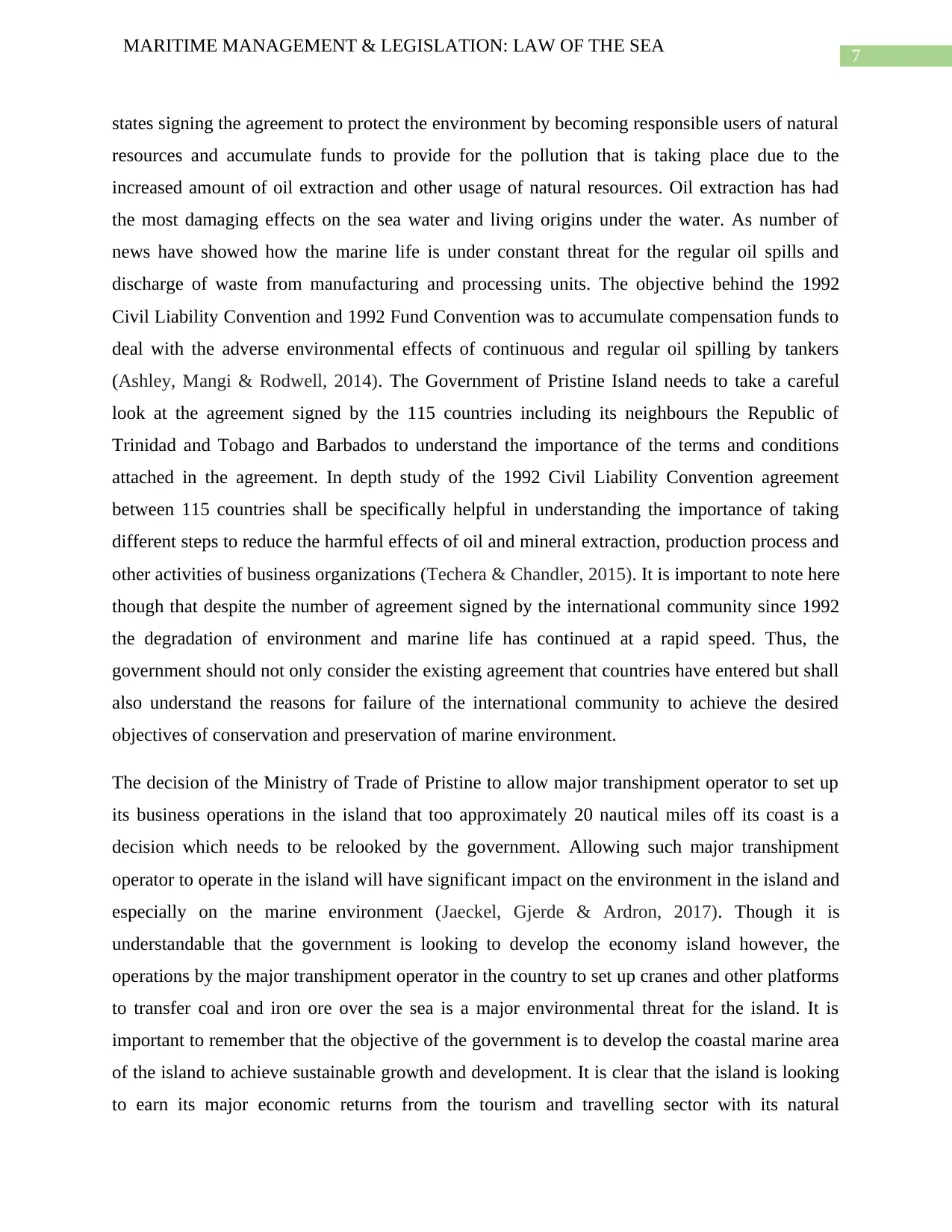
7
MARITIME MANAGEMENT & LEGISLATION: LAW OF THE SEA
states signing the agreement to protect the environment by becoming responsible users of natural
resources and accumulate funds to provide for the pollution that is taking place due to the
increased amount of oil extraction and other usage of natural resources. Oil extraction has had
the most damaging effects on the sea water and living origins under the water. As number of
news have showed how the marine life is under constant threat for the regular oil spills and
discharge of waste from manufacturing and processing units. The objective behind the 1992
Civil Liability Convention and 1992 Fund Convention was to accumulate compensation funds to
deal with the adverse environmental effects of continuous and regular oil spilling by tankers
(Ashley, Mangi & Rodwell, 2014). The Government of Pristine Island needs to take a careful
look at the agreement signed by the 115 countries including its neighbours the Republic of
Trinidad and Tobago and Barbados to understand the importance of the terms and conditions
attached in the agreement. In depth study of the 1992 Civil Liability Convention agreement
between 115 countries shall be specifically helpful in understanding the importance of taking
different steps to reduce the harmful effects of oil and mineral extraction, production process and
other activities of business organizations (Techera & Chandler, 2015). It is important to note here
though that despite the number of agreement signed by the international community since 1992
the degradation of environment and marine life has continued at a rapid speed. Thus, the
government should not only consider the existing agreement that countries have entered but shall
also understand the reasons for failure of the international community to achieve the desired
objectives of conservation and preservation of marine environment.
The decision of the Ministry of Trade of Pristine to allow major transhipment operator to set up
its business operations in the island that too approximately 20 nautical miles off its coast is a
decision which needs to be relooked by the government. Allowing such major transhipment
operator to operate in the island will have significant impact on the environment in the island and
especially on the marine environment (Jaeckel, Gjerde & Ardron, 2017). Though it is
understandable that the government is looking to develop the economy island however, the
operations by the major transhipment operator in the country to set up cranes and other platforms
to transfer coal and iron ore over the sea is a major environmental threat for the island. It is
important to remember that the objective of the government is to develop the coastal marine area
of the island to achieve sustainable growth and development. It is clear that the island is looking
to earn its major economic returns from the tourism and travelling sector with its natural
MARITIME MANAGEMENT & LEGISLATION: LAW OF THE SEA
states signing the agreement to protect the environment by becoming responsible users of natural
resources and accumulate funds to provide for the pollution that is taking place due to the
increased amount of oil extraction and other usage of natural resources. Oil extraction has had
the most damaging effects on the sea water and living origins under the water. As number of
news have showed how the marine life is under constant threat for the regular oil spills and
discharge of waste from manufacturing and processing units. The objective behind the 1992
Civil Liability Convention and 1992 Fund Convention was to accumulate compensation funds to
deal with the adverse environmental effects of continuous and regular oil spilling by tankers
(Ashley, Mangi & Rodwell, 2014). The Government of Pristine Island needs to take a careful
look at the agreement signed by the 115 countries including its neighbours the Republic of
Trinidad and Tobago and Barbados to understand the importance of the terms and conditions
attached in the agreement. In depth study of the 1992 Civil Liability Convention agreement
between 115 countries shall be specifically helpful in understanding the importance of taking
different steps to reduce the harmful effects of oil and mineral extraction, production process and
other activities of business organizations (Techera & Chandler, 2015). It is important to note here
though that despite the number of agreement signed by the international community since 1992
the degradation of environment and marine life has continued at a rapid speed. Thus, the
government should not only consider the existing agreement that countries have entered but shall
also understand the reasons for failure of the international community to achieve the desired
objectives of conservation and preservation of marine environment.
The decision of the Ministry of Trade of Pristine to allow major transhipment operator to set up
its business operations in the island that too approximately 20 nautical miles off its coast is a
decision which needs to be relooked by the government. Allowing such major transhipment
operator to operate in the island will have significant impact on the environment in the island and
especially on the marine environment (Jaeckel, Gjerde & Ardron, 2017). Though it is
understandable that the government is looking to develop the economy island however, the
operations by the major transhipment operator in the country to set up cranes and other platforms
to transfer coal and iron ore over the sea is a major environmental threat for the island. It is
important to remember that the objective of the government is to develop the coastal marine area
of the island to achieve sustainable growth and development. It is clear that the island is looking
to earn its major economic returns from the tourism and travelling sector with its natural
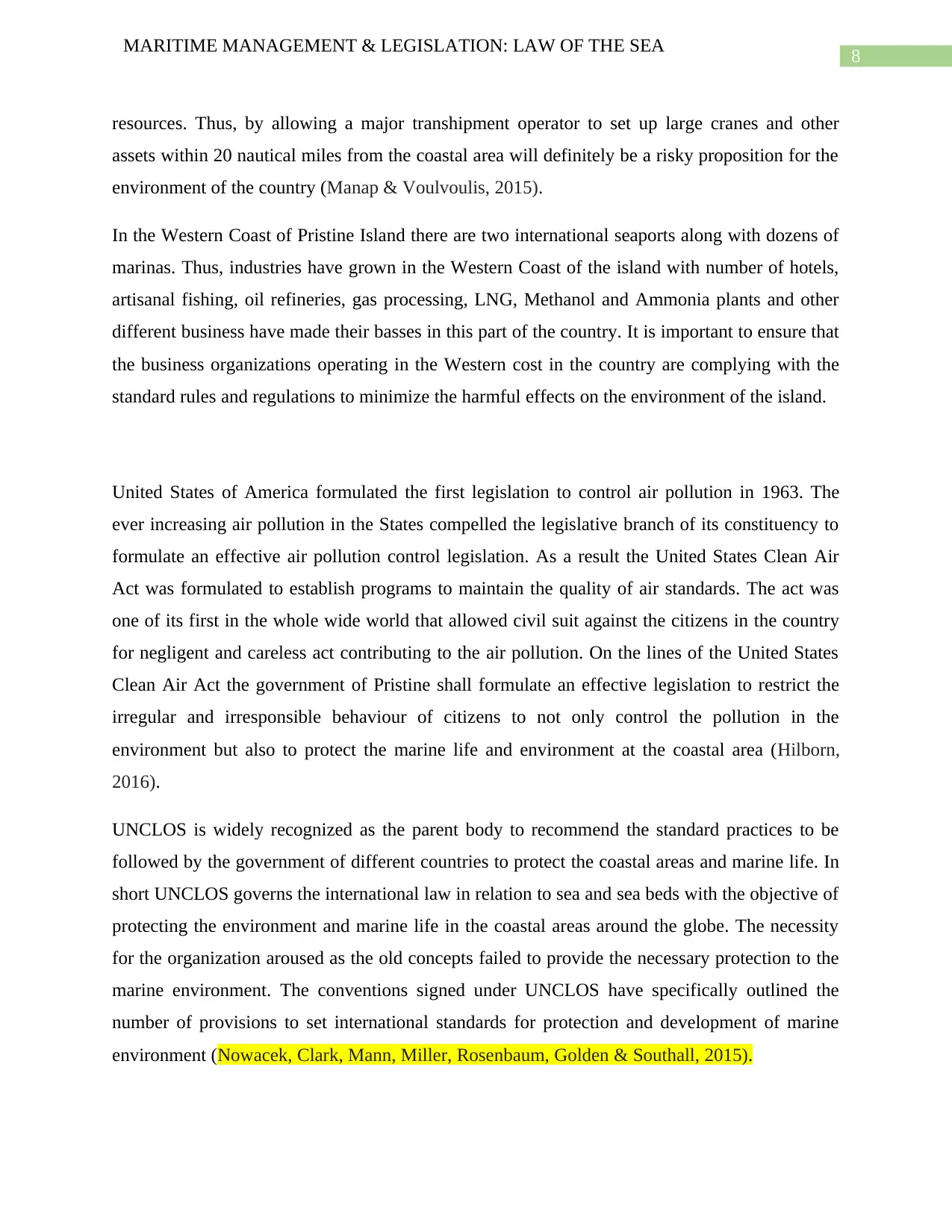
8
MARITIME MANAGEMENT & LEGISLATION: LAW OF THE SEA
resources. Thus, by allowing a major transhipment operator to set up large cranes and other
assets within 20 nautical miles from the coastal area will definitely be a risky proposition for the
environment of the country (Manap & Voulvoulis, 2015).
In the Western Coast of Pristine Island there are two international seaports along with dozens of
marinas. Thus, industries have grown in the Western Coast of the island with number of hotels,
artisanal fishing, oil refineries, gas processing, LNG, Methanol and Ammonia plants and other
different business have made their basses in this part of the country. It is important to ensure that
the business organizations operating in the Western cost in the country are complying with the
standard rules and regulations to minimize the harmful effects on the environment of the island.
United States of America formulated the first legislation to control air pollution in 1963. The
ever increasing air pollution in the States compelled the legislative branch of its constituency to
formulate an effective air pollution control legislation. As a result the United States Clean Air
Act was formulated to establish programs to maintain the quality of air standards. The act was
one of its first in the whole wide world that allowed civil suit against the citizens in the country
for negligent and careless act contributing to the air pollution. On the lines of the United States
Clean Air Act the government of Pristine shall formulate an effective legislation to restrict the
irregular and irresponsible behaviour of citizens to not only control the pollution in the
environment but also to protect the marine life and environment at the coastal area (Hilborn,
2016).
UNCLOS is widely recognized as the parent body to recommend the standard practices to be
followed by the government of different countries to protect the coastal areas and marine life. In
short UNCLOS governs the international law in relation to sea and sea beds with the objective of
protecting the environment and marine life in the coastal areas around the globe. The necessity
for the organization aroused as the old concepts failed to provide the necessary protection to the
marine environment. The conventions signed under UNCLOS have specifically outlined the
number of provisions to set international standards for protection and development of marine
environment (Nowacek, Clark, Mann, Miller, Rosenbaum, Golden & Southall, 2015).
MARITIME MANAGEMENT & LEGISLATION: LAW OF THE SEA
resources. Thus, by allowing a major transhipment operator to set up large cranes and other
assets within 20 nautical miles from the coastal area will definitely be a risky proposition for the
environment of the country (Manap & Voulvoulis, 2015).
In the Western Coast of Pristine Island there are two international seaports along with dozens of
marinas. Thus, industries have grown in the Western Coast of the island with number of hotels,
artisanal fishing, oil refineries, gas processing, LNG, Methanol and Ammonia plants and other
different business have made their basses in this part of the country. It is important to ensure that
the business organizations operating in the Western cost in the country are complying with the
standard rules and regulations to minimize the harmful effects on the environment of the island.
United States of America formulated the first legislation to control air pollution in 1963. The
ever increasing air pollution in the States compelled the legislative branch of its constituency to
formulate an effective air pollution control legislation. As a result the United States Clean Air
Act was formulated to establish programs to maintain the quality of air standards. The act was
one of its first in the whole wide world that allowed civil suit against the citizens in the country
for negligent and careless act contributing to the air pollution. On the lines of the United States
Clean Air Act the government of Pristine shall formulate an effective legislation to restrict the
irregular and irresponsible behaviour of citizens to not only control the pollution in the
environment but also to protect the marine life and environment at the coastal area (Hilborn,
2016).
UNCLOS is widely recognized as the parent body to recommend the standard practices to be
followed by the government of different countries to protect the coastal areas and marine life. In
short UNCLOS governs the international law in relation to sea and sea beds with the objective of
protecting the environment and marine life in the coastal areas around the globe. The necessity
for the organization aroused as the old concepts failed to provide the necessary protection to the
marine environment. The conventions signed under UNCLOS have specifically outlined the
number of provisions to set international standards for protection and development of marine
environment (Nowacek, Clark, Mann, Miller, Rosenbaum, Golden & Southall, 2015).
⊘ This is a preview!⊘
Do you want full access?
Subscribe today to unlock all pages.

Trusted by 1+ million students worldwide
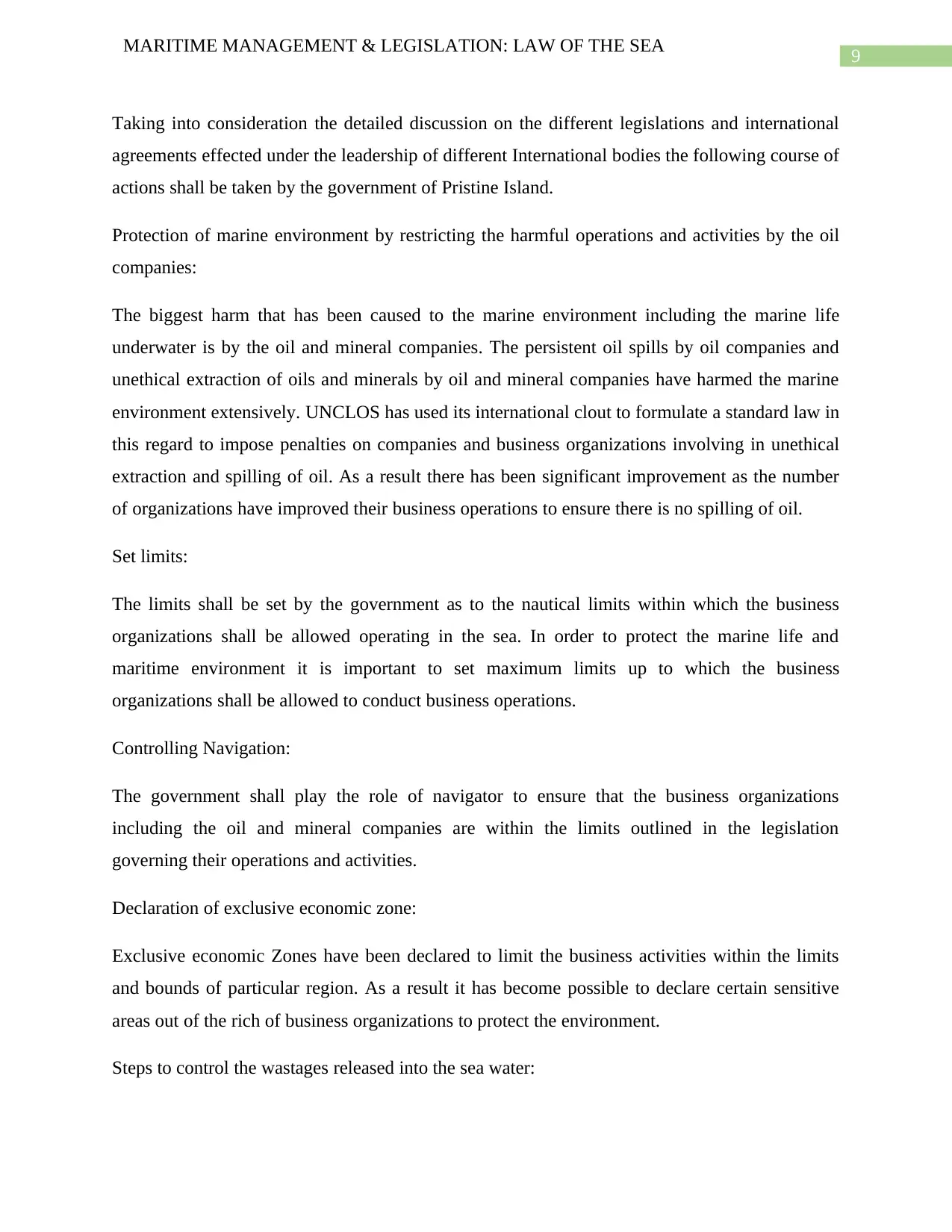
9
MARITIME MANAGEMENT & LEGISLATION: LAW OF THE SEA
Taking into consideration the detailed discussion on the different legislations and international
agreements effected under the leadership of different International bodies the following course of
actions shall be taken by the government of Pristine Island.
Protection of marine environment by restricting the harmful operations and activities by the oil
companies:
The biggest harm that has been caused to the marine environment including the marine life
underwater is by the oil and mineral companies. The persistent oil spills by oil companies and
unethical extraction of oils and minerals by oil and mineral companies have harmed the marine
environment extensively. UNCLOS has used its international clout to formulate a standard law in
this regard to impose penalties on companies and business organizations involving in unethical
extraction and spilling of oil. As a result there has been significant improvement as the number
of organizations have improved their business operations to ensure there is no spilling of oil.
Set limits:
The limits shall be set by the government as to the nautical limits within which the business
organizations shall be allowed operating in the sea. In order to protect the marine life and
maritime environment it is important to set maximum limits up to which the business
organizations shall be allowed to conduct business operations.
Controlling Navigation:
The government shall play the role of navigator to ensure that the business organizations
including the oil and mineral companies are within the limits outlined in the legislation
governing their operations and activities.
Declaration of exclusive economic zone:
Exclusive economic Zones have been declared to limit the business activities within the limits
and bounds of particular region. As a result it has become possible to declare certain sensitive
areas out of the rich of business organizations to protect the environment.
Steps to control the wastages released into the sea water:
MARITIME MANAGEMENT & LEGISLATION: LAW OF THE SEA
Taking into consideration the detailed discussion on the different legislations and international
agreements effected under the leadership of different International bodies the following course of
actions shall be taken by the government of Pristine Island.
Protection of marine environment by restricting the harmful operations and activities by the oil
companies:
The biggest harm that has been caused to the marine environment including the marine life
underwater is by the oil and mineral companies. The persistent oil spills by oil companies and
unethical extraction of oils and minerals by oil and mineral companies have harmed the marine
environment extensively. UNCLOS has used its international clout to formulate a standard law in
this regard to impose penalties on companies and business organizations involving in unethical
extraction and spilling of oil. As a result there has been significant improvement as the number
of organizations have improved their business operations to ensure there is no spilling of oil.
Set limits:
The limits shall be set by the government as to the nautical limits within which the business
organizations shall be allowed operating in the sea. In order to protect the marine life and
maritime environment it is important to set maximum limits up to which the business
organizations shall be allowed to conduct business operations.
Controlling Navigation:
The government shall play the role of navigator to ensure that the business organizations
including the oil and mineral companies are within the limits outlined in the legislation
governing their operations and activities.
Declaration of exclusive economic zone:
Exclusive economic Zones have been declared to limit the business activities within the limits
and bounds of particular region. As a result it has become possible to declare certain sensitive
areas out of the rich of business organizations to protect the environment.
Steps to control the wastages released into the sea water:
Paraphrase This Document
Need a fresh take? Get an instant paraphrase of this document with our AI Paraphraser
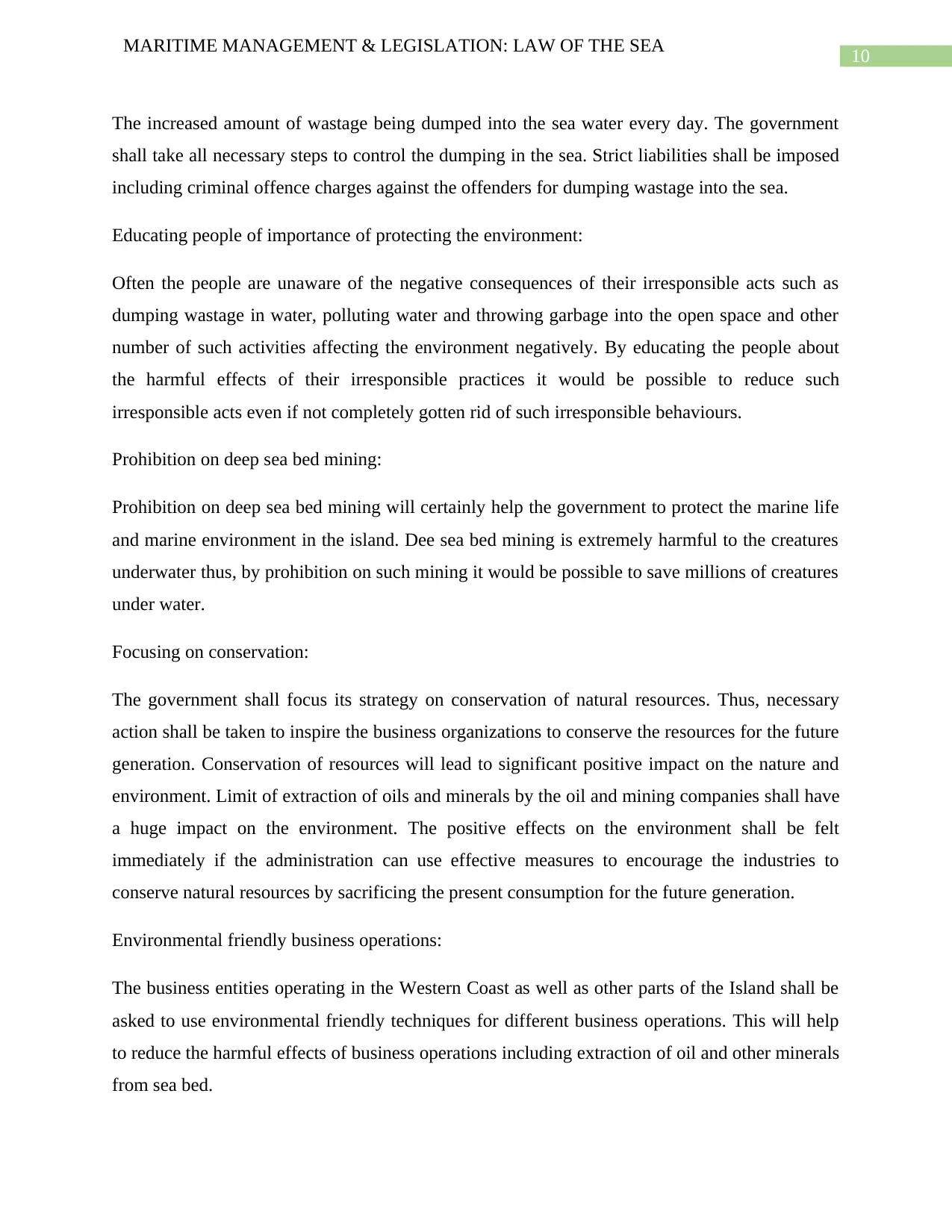
10
MARITIME MANAGEMENT & LEGISLATION: LAW OF THE SEA
The increased amount of wastage being dumped into the sea water every day. The government
shall take all necessary steps to control the dumping in the sea. Strict liabilities shall be imposed
including criminal offence charges against the offenders for dumping wastage into the sea.
Educating people of importance of protecting the environment:
Often the people are unaware of the negative consequences of their irresponsible acts such as
dumping wastage in water, polluting water and throwing garbage into the open space and other
number of such activities affecting the environment negatively. By educating the people about
the harmful effects of their irresponsible practices it would be possible to reduce such
irresponsible acts even if not completely gotten rid of such irresponsible behaviours.
Prohibition on deep sea bed mining:
Prohibition on deep sea bed mining will certainly help the government to protect the marine life
and marine environment in the island. Dee sea bed mining is extremely harmful to the creatures
underwater thus, by prohibition on such mining it would be possible to save millions of creatures
under water.
Focusing on conservation:
The government shall focus its strategy on conservation of natural resources. Thus, necessary
action shall be taken to inspire the business organizations to conserve the resources for the future
generation. Conservation of resources will lead to significant positive impact on the nature and
environment. Limit of extraction of oils and minerals by the oil and mining companies shall have
a huge impact on the environment. The positive effects on the environment shall be felt
immediately if the administration can use effective measures to encourage the industries to
conserve natural resources by sacrificing the present consumption for the future generation.
Environmental friendly business operations:
The business entities operating in the Western Coast as well as other parts of the Island shall be
asked to use environmental friendly techniques for different business operations. This will help
to reduce the harmful effects of business operations including extraction of oil and other minerals
from sea bed.
MARITIME MANAGEMENT & LEGISLATION: LAW OF THE SEA
The increased amount of wastage being dumped into the sea water every day. The government
shall take all necessary steps to control the dumping in the sea. Strict liabilities shall be imposed
including criminal offence charges against the offenders for dumping wastage into the sea.
Educating people of importance of protecting the environment:
Often the people are unaware of the negative consequences of their irresponsible acts such as
dumping wastage in water, polluting water and throwing garbage into the open space and other
number of such activities affecting the environment negatively. By educating the people about
the harmful effects of their irresponsible practices it would be possible to reduce such
irresponsible acts even if not completely gotten rid of such irresponsible behaviours.
Prohibition on deep sea bed mining:
Prohibition on deep sea bed mining will certainly help the government to protect the marine life
and marine environment in the island. Dee sea bed mining is extremely harmful to the creatures
underwater thus, by prohibition on such mining it would be possible to save millions of creatures
under water.
Focusing on conservation:
The government shall focus its strategy on conservation of natural resources. Thus, necessary
action shall be taken to inspire the business organizations to conserve the resources for the future
generation. Conservation of resources will lead to significant positive impact on the nature and
environment. Limit of extraction of oils and minerals by the oil and mining companies shall have
a huge impact on the environment. The positive effects on the environment shall be felt
immediately if the administration can use effective measures to encourage the industries to
conserve natural resources by sacrificing the present consumption for the future generation.
Environmental friendly business operations:
The business entities operating in the Western Coast as well as other parts of the Island shall be
asked to use environmental friendly techniques for different business operations. This will help
to reduce the harmful effects of business operations including extraction of oil and other minerals
from sea bed.
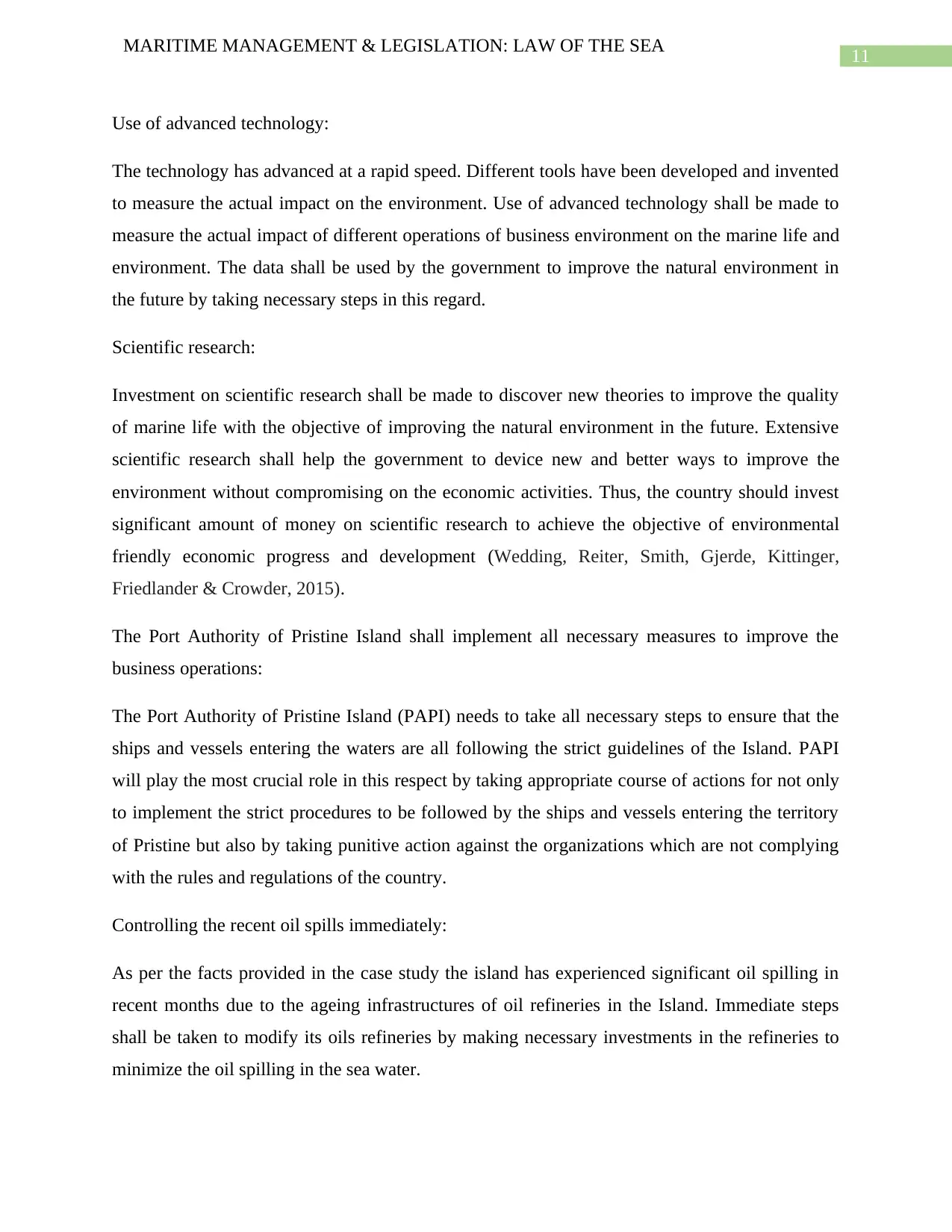
11
MARITIME MANAGEMENT & LEGISLATION: LAW OF THE SEA
Use of advanced technology:
The technology has advanced at a rapid speed. Different tools have been developed and invented
to measure the actual impact on the environment. Use of advanced technology shall be made to
measure the actual impact of different operations of business environment on the marine life and
environment. The data shall be used by the government to improve the natural environment in
the future by taking necessary steps in this regard.
Scientific research:
Investment on scientific research shall be made to discover new theories to improve the quality
of marine life with the objective of improving the natural environment in the future. Extensive
scientific research shall help the government to device new and better ways to improve the
environment without compromising on the economic activities. Thus, the country should invest
significant amount of money on scientific research to achieve the objective of environmental
friendly economic progress and development (Wedding, Reiter, Smith, Gjerde, Kittinger,
Friedlander & Crowder, 2015).
The Port Authority of Pristine Island shall implement all necessary measures to improve the
business operations:
The Port Authority of Pristine Island (PAPI) needs to take all necessary steps to ensure that the
ships and vessels entering the waters are all following the strict guidelines of the Island. PAPI
will play the most crucial role in this respect by taking appropriate course of actions for not only
to implement the strict procedures to be followed by the ships and vessels entering the territory
of Pristine but also by taking punitive action against the organizations which are not complying
with the rules and regulations of the country.
Controlling the recent oil spills immediately:
As per the facts provided in the case study the island has experienced significant oil spilling in
recent months due to the ageing infrastructures of oil refineries in the Island. Immediate steps
shall be taken to modify its oils refineries by making necessary investments in the refineries to
minimize the oil spilling in the sea water.
MARITIME MANAGEMENT & LEGISLATION: LAW OF THE SEA
Use of advanced technology:
The technology has advanced at a rapid speed. Different tools have been developed and invented
to measure the actual impact on the environment. Use of advanced technology shall be made to
measure the actual impact of different operations of business environment on the marine life and
environment. The data shall be used by the government to improve the natural environment in
the future by taking necessary steps in this regard.
Scientific research:
Investment on scientific research shall be made to discover new theories to improve the quality
of marine life with the objective of improving the natural environment in the future. Extensive
scientific research shall help the government to device new and better ways to improve the
environment without compromising on the economic activities. Thus, the country should invest
significant amount of money on scientific research to achieve the objective of environmental
friendly economic progress and development (Wedding, Reiter, Smith, Gjerde, Kittinger,
Friedlander & Crowder, 2015).
The Port Authority of Pristine Island shall implement all necessary measures to improve the
business operations:
The Port Authority of Pristine Island (PAPI) needs to take all necessary steps to ensure that the
ships and vessels entering the waters are all following the strict guidelines of the Island. PAPI
will play the most crucial role in this respect by taking appropriate course of actions for not only
to implement the strict procedures to be followed by the ships and vessels entering the territory
of Pristine but also by taking punitive action against the organizations which are not complying
with the rules and regulations of the country.
Controlling the recent oil spills immediately:
As per the facts provided in the case study the island has experienced significant oil spilling in
recent months due to the ageing infrastructures of oil refineries in the Island. Immediate steps
shall be taken to modify its oils refineries by making necessary investments in the refineries to
minimize the oil spilling in the sea water.
⊘ This is a preview!⊘
Do you want full access?
Subscribe today to unlock all pages.

Trusted by 1+ million students worldwide
1 out of 16
Related Documents
Your All-in-One AI-Powered Toolkit for Academic Success.
+13062052269
info@desklib.com
Available 24*7 on WhatsApp / Email
![[object Object]](/_next/static/media/star-bottom.7253800d.svg)
Unlock your academic potential
Copyright © 2020–2026 A2Z Services. All Rights Reserved. Developed and managed by ZUCOL.





